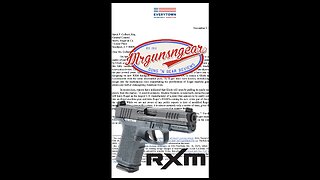Premium Only Content

Navigating Electronic Imports from UAE: Regulations, Bonds, and Compliance
ISF Entry | Phone: 800-215-1849 | Email: [email protected] | https://isfentry.com/
Welcome back to our customs brokerage video series! In today's episode, we will be focusing on the customs regulations for importing electronics from the United Arab Emirates (UAE). As an importer, it is crucial to have a deep understanding of the specific regulations and requirements that apply to electronic imports.
The first key aspect to consider when importing electronics from the UAE is the requirement for a customs bond. A customs bond is a financial guarantee that ensures the importer complies with all customs regulations and pays any duty, taxes, or penalties that may arise. Importers can choose between a single-entry bond for one-time shipments or a continuous bond for frequent and ongoing imports.
Another important regulation to be aware of is the Importer Security Filing (ISF) requirement. The ISF must be filed by the importer or their authorized agent at least 24 hours before the cargo is loaded onto the vessel destined for the United States. It includes crucial information such as the shipper's details, container stuffing location, and itemized description of the goods. Timely and accurate filing of the ISF is essential to avoid penalties or delays in the clearance process.
Product compliance and certifications are additional considerations when importing electronics. It is crucial to ensure that the imported electronics meet the relevant safety standards and regulations. Regulatory bodies such as the Federal Communications Commission (FCC) and the Consumer Product Safety Commission (CPSC) enforce specific requirements for electronic devices in the United States. Failure to comply with these regulations can result in the seizure of goods or other enforcement actions.
Maintaining accurate documentation and recordkeeping is paramount when importing electronics from the UAE. Customs authorities may request various documents during the clearance process or for post-entry audits. Some essential documents include commercial invoices, bill of lading, packing lists, and any product certifications or test reports. It is important to organize and retain these documents for a specified period, typically five years, as required by the US Customs and Border Protection (CBP).
In conclusion, importing electronics from the UAE requires a comprehensive understanding of the customs regulations and requirements. Key considerations include obtaining a customs bond, filing the Importer Security Filing (ISF) on time, ensuring product compliance and certifications, and maintaining accurate documentation and records. Working with an experienced customs brokerage firm can help navigate the complexities of electronic imports efficiently. Thank you for watching, and stay tuned for more informative episodes in our customs brokerage video series!
#usimportbond #isfcustomsbroker #uscustomsclearing #isfentry
Video Disclaimer Here: This educational content is unassociated with US governmental bodies.
00:27 - Customs Bond Requirement: Importers of electronics from the UAE must secure a customs bond, which acts as a financial guarantee to comply with customs regulations and pay any associated duties or penalties. Importers can choose between a single-entry bond for one-time shipments or a continuous bond for frequent imports.
01:06 - Importer Security Filing (ISF): Importers or their agents must file the ISF at least 24 hours before cargo is loaded onto a vessel bound for the U.S. The filing should include key information about the shipment, and accurate submission is crucial to avoid penalties and delays.
02:12 - Product Compliance and Certifications: Electronics imported from the UAE must meet U.S. safety standards and regulations enforced by agencies like the FCC and CPSC. Importers should verify that products have the necessary certifications to avoid enforcement actions, including potential seizure of goods.
03:10 - Documentation and Recordkeeping: Maintaining accurate documentation, such as commercial invoices and product certifications, is essential for customs clearance and audits. Importers should organize these records for at least five years to ensure compliance and support any inquiries by customs authorities.
-
 2:16:26
2:16:26
Megyn Kelly
19 hours agoBen Shapiro Responds to Tucker Carlson, Plus Sydney Sweeney and Newsom, with Knowles and Klavan
23.1K83 -
 56:11
56:11
X22 Report
1 hour agoMr & Mrs X - Women Are Fighting Back Against Men In Women's Spaces, It Has Begun - EP 15
5.89K4 -
 20:46
20:46
Jasmin Laine
1 day agoJoe Rogan Drops NUKE—Carney’s Secret Deal + 100,000 Kamloops Homes at Risk
1.93K16 -
 4:00
4:00
Mrgunsngear
1 day ago $14.62 earnedFirst They Came For Glock, Now They're Coming For The Ruger RXM
7.54K16 -
 1:42:46
1:42:46
Lara Logan
1 day agoINJECTING TRUTH INTO THE VACCINE DEBATE with Del Bigtree | Ep 43 | Going Rogue with Lara Logan
6.79K31 -
 12:55
12:55
Cash Jordan
19 hours agoNYC Busses 'MOBBED' by Millionaires... as "Communist" Mayor VOWS to END AMERICA
38218 -
 LIVE
LIVE
Major League Fishing
1 day agoLIVE! MLF Toyota Series Championship!
644 watching -
 18:54
18:54
Bearing
1 day agoNew York COMMUNIST TAKEOVER 🚨 Zoran Mamdani’s Revolution 💥
3.12K66 -
 1:05:26
1:05:26
Man in America
1 day ago“Poseidon” Doomsday Sub, Microplastics & The War on Testosterone w/ Kim Bright
40.2K55 -
 12:15
12:15
Degenerate Jay
21 hours agoIs GTA 6 In Trouble?
226